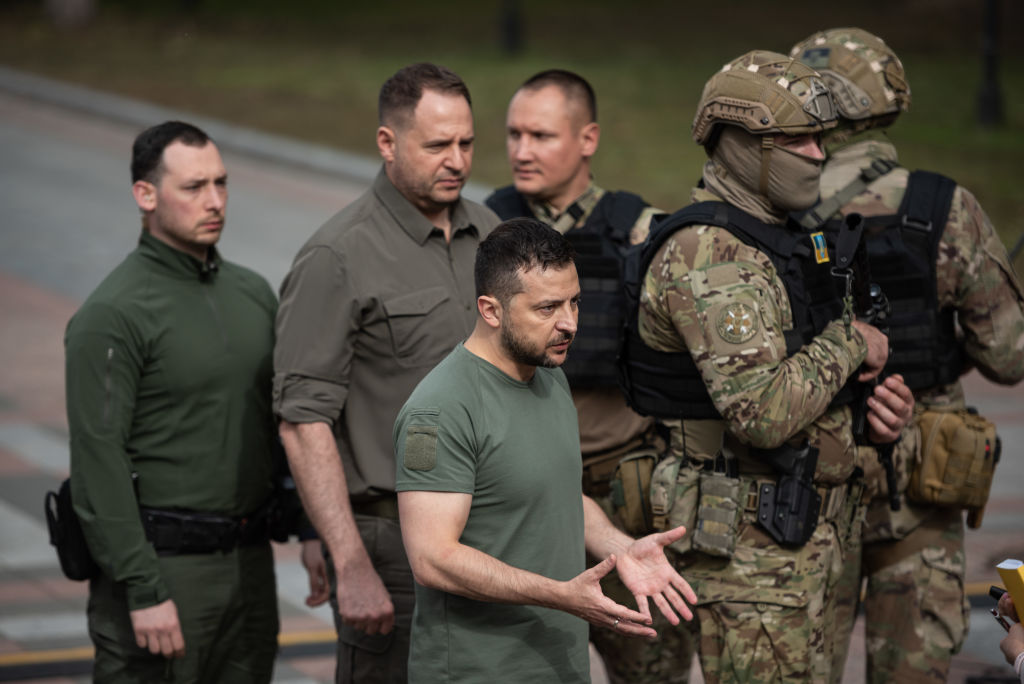As Ukraine forces Russia back, they are fighting for our global security as well as themselves

A meme is circulating on social media. A man is trying to wake up his sleeping partner, saying “Honey, wake up: Ukraine’s liberated fifteen towns, the names of which I can’t pronounce.”
Like all virally successful memes this one captures something true. The man in the picture doesn’t know the territory of Ukraine nor can he pronounce Balakliia, Dnipropetrovsk or Okhtyrka. But he knows it matters, not just for Ukraine but for Europe and the post-Cold War world of freedom.
A Russian victory in Ukraine will not just embolden Moscow and may see further pressure on European states like Estonia and Lithuania. It will also undermine many of the norms that have been built up since the Nuremberg Trials that ethically bookended World War II – like the norm of non-aggression and the prohibition of genocide. It will make Europe less free and less secure.
Conversely, a Russian defeat and withdrawal from Ukraine will weaken Vladimir Putin’s authoritarian regime, limit Russia’s aggressive scope and arguably give the Chinese leadership pause for thought as they consider their Taiwan policy.
China’s military, like Russia’s, hasn’t been tested against a well-motivated, quasi-conventional force since the war against Vietnam in late 1970s, which ended badly for Beijing. China’s military leadership may semi-publicly blame Russia’s military misfortunates on corruption, and ill-preparedness but know privately that their own ranks would face similar problems in a war over Taiwan.
So the man in the meme is right about the big picture even if he doesn’t know the details. But what makes the meme so share-worthy is that it simultaneously speaks to something else: the fact that many people do not care and would rather ignore the war and continue sleeping. The man’s partner is asleep, ignoring his battlefield updates.
For many, Ukraine feels like a very foreign country, far away from the UK. Historical links aren’t well-known even if many Welshman actually built much of eastern Ukraine in the 19th century. Ukraine’s recent statehood – it regained its independence only after the Soviet Union collapsed – means many people are susceptible to Moscow’s propaganda which denies that Ukraine even has a separate identity from Russia.
Perhaps even more apt – many people don’t want to know. The war has contributed to a dramatic rise in energy costs and helped fuel the greatest inflationary pressures seen since the 1970s. For the first time in generations, people who have worked hard and saved their money will find themselves broke, unable to pay their bills, mortgages and perhaps even without jobs as their employers collapse under the economic strain. To them, ensuring a swift end to the war seems like the best way to push prices down and secure their livelihoods. At the very least, prolonging the war by supplying Ukraine seems unwise.
While this is a totally understandable sentiment, ignoring the reality of Russia’s war in Ukraine is not possible. The world cannot go back to where it was before Russia’s illegal invasion. Doing so won’t lead to peace and lower prices. It will lead to an emboldened Russia which will continue to use its control over oil and energy to sway Europe. Prices won’t go down; they will continue to rise. Conflict won’t stop, it will be broadened out. The only way to return to the normality we have become accustomed to is to help Ukraine win.
Thankfully, Ukraine’s battlefield success has made it easier to see how increased arms can make a difference. The UK has been at the forefront of international support for Kyiv and prime minister Liz Truss is as unwavering in her support as her predecessor was. But the truth is that Ukraine needs more weaponry than it has been receiving. Rather than prolonging the war and therefore the economic crisis, Ukraine has shown that supplying its forces with more weapons will shorten the conflict and make it more likely that the world can swiftly return to the status quo ante.
The man in the meme is right. Ukraine’s battlefield success should be a wake-up call. A call to arming the Ukrainians more – so they can liberate themselves, free Europe from the threat of Russia’s yoke and help return the economy to normality. Sleeping on or ignoring the events while hoping for the best is the worst option.
